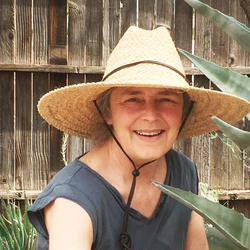Hope Leeson
Hope Leeson is a field botanist with 30 years of experience investigating wild plant communities throughout the northeast and desert southwest of North America. An adjunct faculty member since 2012, Hope teaches on the science of botany and plant ecology. Her pedagogical approach brings students into direct contact with plants in all seasons, encouraging them to deeply observe through touch, taste, smell, and sight. She is dedicated to advancing the understanding of plants as integral to the function of ecological systems on earth, and their influence on soil, atmosphere, and climate.
Hope’s work outside of teaching includes documenting Rhode Island’s rare plant populations, native plant communities, invasive species, and performing wetland assessments for environmental organizations, engineering firms, and government agencies. As botanist at the Rhode Island Natural History Survey, she established the Rhody Native initiative to sustainably collect wild seed for native plant propagation.
Hope holds a BA in Visual Arts from Brown University, with a concentration in painting. She received RISD’s Color Lab Fellowship, where she explored the dye potentials of Rhode Island’s native plants and presented Colors of the Land. Recent projects include collabortion with the Below and Above Collective to construct a series of floating wetlands focused on rebalancing life in freshwater aquatic communities. Hope also collaborates with fellow RISD LDAR faculty to understand the needs of the Moshassuck River and the floodplain plant species at work there to recreate a river floodplain. In 2024 their findings were presented at the Society for Ecological Restoration, North American Conference.
